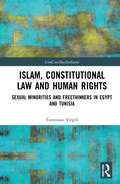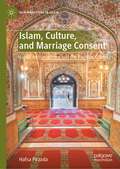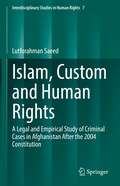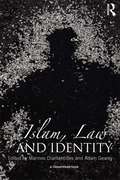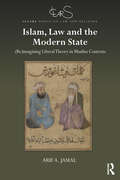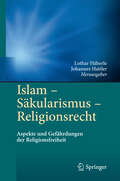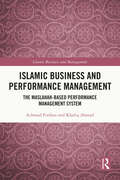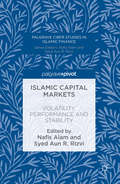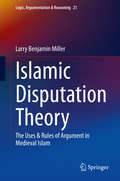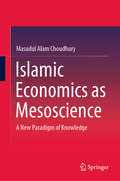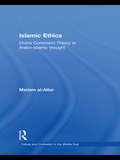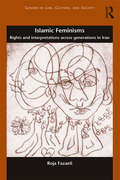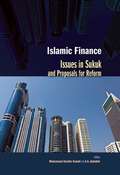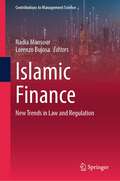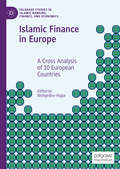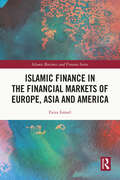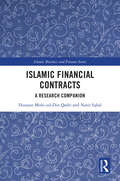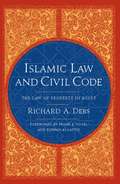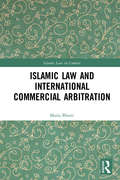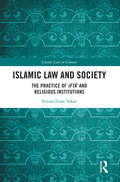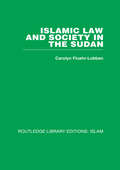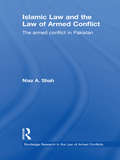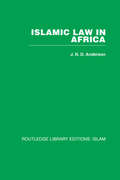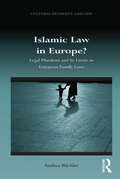- Table View
- List View
Islam, Constitutional Law and Human Rights: Sexual Minorities And Freethinkers In Egypt And Tunisia (Comparative Constitutionalism in Muslim Majority States)
by Tommaso VirgiliThis book focuses on Islamic constitutionalism, and in particular on the relation between religion and the protection of individual liberties potentially clashing with shariᶜa and the Islamic ethos. The analysis goes from general to particular, starting with a theoretical overview on constitutionalism, human rights and Islam, moving to the assessment of the post-Arab Spring Constitutions of Egypt and Tunisia, and concluding with a specific focus on the rights of sexual minorities and freethinkers. Part I provides a theoretical account of the conception of constitutionalism and human rights in Islam, compared and contrasted with Western constitutionalism. A set of issues where the tension between shariᶜa and human rights is accentuated is analysed against the backdrop of the main Islamic charters of rights. Part II conducts a similar assessment based on the Constitutions of Tunisia and Egypt – the two main epicentres of the Arab Spring. Part III moves to two specific rights in the same countries, from the twofold perspective of the Constitutions and international law: the freedom from interference in one’s intimate life, with particular regard to homosexuality; and the freedom of holding and expressing nonconventional beliefs, deemed unacceptable from the point of view of traditional Islam. These issues have been chosen as representative of the most controversial, still considered taboo in both legal and social terms, hence at the fringes of the debate on individual freedoms. Focusing on two overlooked and underexplored issues, the work thus pushes the boundaries of the human rights discourse in Muslim contexts.
Islam, Culture, and Marriage Consent: Hanafi Jurisprudence and the Pashtun Context (New Directions in Islam)
by Hafsa PirzadaThis book presents an empirical examination of consent-seeking among Pashtun Muslims in the Pakistani province of Khyber Pakhtunkhwa (KPK), to determine whether cultural norms and beliefs have largely come to diverge from the principles of consent in Islamic law and jurisprudence. Is culture part of the ‘inevitable decay’ to which Max Müller says every religion is exposed? Or – if rephrased in terms of the research encapsulated within this book – are cultural beliefs and practises the inevitable decay to which Islam has been exposed in Muslim societies? Drawing on interviews with Muslims in Pakistan and Australia, the research broadly broaches questions around the rights of women in Islam and contributes to a wider understanding of Muslim social, cultural, and religious practices in both Muslim majority nations and diaspora communities. The author disentangles cultural practices from both religious and universal legal principles, demonstrating how consent seeking in Pashtun culture generally does not reflect the spirit or the intent of consent as described in Hanafī law and jurisprudence. This research will be of interest to students and scholars across sociology, anthropology, socio-legal studies, and law, with a focus on Islamically-justified law reform in Muslim nation states.
Islam, Custom and Human Rights: A Legal and Empirical Study of Criminal Cases in Afghanistan After the 2004 Constitution (Interdisciplinary Studies in Human Rights #7)
by Lutforahman SaeedFor the first time, the author has explored the intertwinement of written law, Islamic law, and customary law in the highly complex Afghan society, being deeply influenced by traditional cultural and religious convictions. Given these facts, the author explores how to bridge the exigencies of a human rights–driven penal law and conflicting social norms and understandings by using the rich tradition of Islamic law and its possible openness for contemporary rule of law standards. This work is based on ample field research in connection with a thorough analysis of the normative contexts. It is a landmark, since it offers broadly acceptable and thus feasible solutions for the Afghan legal practice. The book is of equal interest for scientists and practitioners interested in legal, religious, social, and political developments concerning human rights and regional traditions in the MENA region, in Afghanistan in particular.
Islam, Law and Identity
by Marinos Diamantides Adam GeareyThe essays brought together in Islam, Law and Identity are the product of a series of interdisciplinary workshops that brought together scholars from a plethora of countries. Funded by the British Academy the workshops convened over a period of two years in London, Cairo and Izmir. The workshops and the ensuing papers focus on recent debates about the nature of sacred and secular law and most engage case studies from specific countries including Egypt, Israel, Kazakhstan, Mauritania, Pakistan and the UK. Islam, Law and Identity also addresses broader and over-arching concerns about relationships between religion, human rights, law and modernity. Drawing on a variety of theoretical and empirical approaches, the collection presents law as central to the complex ways in which different Muslim communities and institutions create and re-create their identities around inherently ambiguous symbols of faith. From their different perspectives, the essays argue that there is no essential conflict between secular law and Shari`a but various different articulations of the sacred and the secular. Islam, Law and Identity explores a more nuanced and sophisticated understanding of the tensions that animate such terms as Shari`a law, modernity and secularization
Islam, Law and the Modern State: (Re)imagining Liberal Theory in Muslim Contexts (ICLARS Series on Law and Religion)
by Arif A. JamalWithin the global phenomenon of the (re)emergence of religion into issues of public debate, one of the most salient issues confronting contemporary Muslim societies is how to relate the legal and political heritage that developed in pre-modern Islamic polities to the political order of the modern states in which Muslims now live. This work seeks to develop a framework for addressing this issue. The central argument is that liberal theory, and in particular justice as discourse, can be normatively useful in Muslim contexts for relating religion, law and state. Just as Muslim contexts have developed historically, and continue to develop today, the same is the case with the requisites of liberal theory, and this may allow for liberal choices to be made in a manner that is not a renunciation of Muslim heritage.
Islam - Säkularismus - Religionsrecht
by Lothar Häberle Johannes HattlerSeit Gründung der Bundesrepublik ist die religiöse Zusammensetzung der Gesellschaft heterogener und konfliktreicher geworden: Zugenommen hat die Gruppe der Religionslosen, von denen einige aktiv für einen weltanschaulichen Säkularismus eintreten, und die der Muslime unterschiedlichen Bekenntnisses. Dem Islam selbst und seiner komplexen Beziehung zum Verfassungsstaat sind zwei Beiträge gewidmet, ein weiterer säkularistischen (bzw. laizistischen) Positionen. Mehrere Kapitel gehen der Frage nach, wie das staatliche Religionsrecht auf die Herausforderungen Islam und Säkularismus reagieren sollte und ob es einer Neujustierung bedarf. Abschließend werden zwei konträre Urteile des Europäischen Gerichtshofs für Menschenrechte (EGMR) zu einem italienischen Schulkreuz-Fall analysiert.
Islamic Business and Performance Management: The Maslahah-Based Performance Management System (Islamic Business and Management)
by Achmad Firdaus Khaliq AhmadThis unique book discovers a new dimension in the study of strategic and performance management in Islamic Business studies. It addresses the missing link of spirituality from modern-day organizational structure in the presence of high-tech pressure in all areas of human endeavours. The authors propose an integrated study of Islamic business approach to strategic and performance management systems to achieve sustainable organizational performance. The book explores employees’ wellbeing and organizations’ perceiving work environment as a spiritual pathway to cultivate values in Islamic business ecosystem to sustain humanity. It is all about care, empathy, and sustenance of others, about truthfulness and management being truthful to themselves and others and endeavouring to live their values more effusively while performing their work. The book stresses the impact of spirituality in performance management, concluding that for any organization to run efficiently, spirituality is the core component to attain happiness, contentment, and success. The book will be of interest to a variety of management scholars, including those researching and studying performance management, talent management, strategic management, and business ethics.
Islamic Capital Markets
by Nafis Alam Syed Aun R. RizviThis book addresses contemporary empirical issues in Islamic stock markets including volatility, efficiency and Sukuk defaults. The studies contained within this book consider a combination of pure Islamic stock markets and comparative studies, with reference to their conventional counterparts. The authors provide up-to-date, robust, accurate, reliable empirical enquiries addressing current issues of stock markets as well as providing up to date information and statistics to support future development and research. The book also covers a chapter on the current trends in research in Islamic capital markets, which analyses some recent and leading works to highlight and indicate the gaps in research that require further exploration. This book will be of value to all those who wish to gain a more thorough understanding of research in Islamic capital markets and the major topics in the field.
Islamic Disputation Theory: The Uses & Rules of Argument in Medieval Islam (Logic, Argumentation & Reasoning #21)
by Larry Benjamin MillerThis book charts the evolution of Islamic dialectical theory (jadal) over a four-hundred year period. It includes an extensive study of the development of methods of disputation in Islamic theology (kalām) and jurisprudence (uṣūl al-fiqh) from the tenth through the fourteenth centuries. The author uses the theoretical writings of Islamic theologians, jurists, and philosophers to describe the conceptOverall, this investigation looks at the extent to which the development of Islamic modes of disputation is rooted in Aristotle and the classical tradition. The author reconstructs the contents of the earliest systematic treatment of the subject by b. al-Rīwandī. He then contrasts the theological understanding of dialectic with the teachings of the Arab Aristotelians–al-Fārābī, Avicenna, and Averroes. Next, the monograph shows how jurists took over the theological method of dialectic and applied it to problems peculiar to jurisprudence. Although the earliest writings on dialectic are fairly free of direct Aristotelian influence, there are coincidences of themes and treatment. But after jurisprudence had assimilated the techniques of theological dialectic, its own theory became increasingly influenced by logical terminology and techniques. At the end of the thirteenth century there arose a new discipline, the ādāb al-baḥth. While the theoretical underpinnings of the new system are Aristotelian, the terminology and order of debate place it firmly in the Islamic tradition of disputation.
Islamic Economics as Mesoscience: A New Paradigm of Knowledge
by Masudul Alam ChoudhuryThis book presents the building blocks of Islamic economics as meso-science, offering an in-depth study of the Qur’anic worldview of the monotheistic unity of knowledge, which is the universal and unique message of Tawhid in the Qur’an. This primal ontological premise is formalised in an analytical approach that introduces and unpacks the philosophical concepts of ontology, epistemology, and phenomenology in relation to the Tawhidi methodological worldview. The analysis of Qur’anic logical consistency is then cast in a phenomenological perspective by applying the complete model of the unity of knowledge of the Qur’an in a specific study of the Tawhidi methodological approach to Islamic financial-economic theory. In doing so, it tackles the problems of meso-economics given its socio-scientific holism in world affairs. It hones in on the results of the symbiotic modulation of evolutionary learning processes in the world system of the unity of knowledge and its material embedding across knowledge, and knowledge-induced space and time dimensions. The author poses that Shari’ah is only partial in its scope, and excludes an analytical methodological worldview. Shari’ah is thus cast in the midst of a meso-socio-scientific absence of any appertaining methodology. The book is a landmark work in the conceptual and applied understanding of Tawhid as the methodological worldview of the monotheistic unity of knowledge in the meso-socio-scientific realm of ‘everything’, particularised to Islamic economics. Adopting an inter-disciplinary view integrating various fields, it challenges pervasive Western academic and institutional thinking in terms of economics. It will be of interest to students and researchers in Islamic economics, religious theory, Islamic philosophy, development studies, and finance.
Islamic Ethics: Divine Command Theory in Arabo-Islamic Thought (Culture and Civilization in the Middle East)
by Mariam al-AttarThis book explores philosophical ethics in Arabo-Islamic thought. Examining the meaning, origin and development of "Divine Command Theory", it underscores the philosophical bases of religious fundamentalism that hinder social development and hamper dialogue between different cultures and nations. Challenging traditional stereotypes of Islam, the book refutes contemporary claims that Islam is a defining case of ethical voluntarism, and that the prominent theory in Islamic ethical thought is Divine Command Theory. The author argues that, in fact, early Arab-Islamic scholars articulated moral theories: theories of value and theories of obligation. She traces the development of Arabo-Islamic ethics from the early Islamic theological and political debates between the Kharijites and the Murji’ites, shedding new light on the moral theory of Abd al-Jabbar al-Mu’tazili and the effects of this moral theory on post-Mu’tazilite ethical thought. Highlighting important aspects in the development of Islamic thought, this book will appeal to students and scholars of Islamic moral thought and ethics, Islamic law, and religious fundamentalism.
Islamic Feminisms: Rights and Interpretations Across Generations in Iran (Gender in Law, Culture, and Society)
by Roja FazaeliThis book explores the contentious topic of women’s rights in Muslim-majority countries, with a specific focus on Iran and the Iranian women’s movement from 1906 to the present. The work contextualizes the authorial self through the use of personal narrative and interviews. A new critique of Islamic law is produced through an in-depth study of the Iranian Constitution, civil and criminal codes. The work presents a novel reconceptualization of the term "Islamic feminism" by revisiting the arguments of various scholars and through analysis of interviews with Iranian women’s rights activists. It is contended that the feminist movements can play a critical role in Islamic law reform and consequently the eventual implementation of international human rights law in Muslim-majority countries. What emerges from this study is not only a feminist critique of two major regimes of law, but also the identification of possibilities for reform in the future. The study transitions from the Iranian national context to the international by way of a comparative legal study of international human rights laws and Islamic laws. The book will appeal both to academics and human rights practitioners.
Islamic Finance: Issues in Sukuk and Proposals for Reform
by Mohammad Hashim Kamali A. K. AbdullahThis collection of essays brings together leading scholars and practitioners to discuss contemporary issues in the rapidly expanding sukuk market, and frankly debates the challenges facing it since the 2008 financial crisis.Highly recommended for practitioners, scholars, and students of Islamic finance.Professor Mohammad Hashim Kamali is the founding chairman and CEO of the International Institute of Advanced Islamic Studies (IAIS) in Malaysia, and is a leading authority in Islamic jurisprudence, Islamic finance, and human rights in Islamic law.A.K. Abdullah is an assistant research fellow at the IAIS.
Islamic Finance: New Trends in Law and Regulation (Contributions to Management Science)
by Nadia Mansour Lorenzo BujosaThis volume discusses the new trends in law and regulation in Islamic finance. Islamic finance is a particular component of the global financial system and is very different from secular finance. To understand the development of Islamic finance, it is important to place it in the context of financial globalization. Islamic finance is a new force in the contemporary world financial system and is present in more than a hundred countries. The current generation of Muslim economic power is crowding into the world's financial currents with trillions in liquidity and is growing at a high rate of 10-15% per year. Islamic finance is coming into focus and is not confined to Islamic countries but is present in every larger Muslim community, which means that it cannot be isolated from the effects of financial globalization. This edited volume discusses the effects of global financial transactions in Islamic finance and how it impacts its law and regulation.
Islamic Finance in Europe: A Cross Analysis of 10 European Countries (Palgrave Studies in Islamic Banking, Finance, and Economics)
by Mohyedine HajjarInformation about Islamic finance in European countries is usually provided by professional-style reports, offering practical data on implementation of standardized products. However, precise developments about material legal provisions applicable to contracts and their actual legal regime are not often detailed. In order to fill this gap, 15 researchers from across Europe contributed to this project. They describe the state of actual Islamic finance in 10 European countries, as well as applicable EU law. By combining legal analysis with statistical description of existing practices and social demand, this book provides an exhaustive account of the current potential of Islamic finance in Europe.
Islamic Finance in the Financial Markets of Europe, Asia and America (Islamic Business and Finance Series)
by Faiza IsmailAmong international financial centres (IFCs), London is known as the ‘Western hub of Islamic Finance’, on account of its well-developed legal infrastructure. However, Brexit has threatened London’s status and consequently, the financial services industry is moving to Dublin to continue operating in the Euro region. Similarly, Islamic finance (IF) service providers in the UK are also looking to Dublin for expansion of this niche area in euro member states. This is the first book to be written about Islamic finance operations in the Eurozone. The book offers an in-depth description of International Financial Centres and the growth of Islamic Finance, compares the growth of Islamic finance in London, Dubai and Kuala Lumpur, outlines the implications of Brexit for financial service providers in London in general and Islamic investors in particular and also presents a case study of Ireland to establish the latter as the most appropriate country to promote IF in the Eurozone. The time is particularly right for a book exploring the potential of Ireland to emerge as a Eurozone hub of Islamic finance, as a result of Britain’s exit from Europe. The book will cater to the needs of readers studying Islamic finance (IF) in the disciplines of economics, business, law, and religion. A secondary market includes practitioners, such as policymakers, lawyers, fund managers, accountants, regulators and international investors, who will be interested in exploring the benefits that the UK and Ireland have to offer the Islamic finance industry.
Islamic Financial Contracts: A Research Companion (Islamic Business and Finance Series)
by Hussain Mohi-ud-Din Qadri Nasir IqbalIslam encourages business and financial transactions as a way of securing the basic needs for all human beings, but these need to be conducted in accordance with the principles contained in the Qur’ān and Sunnah. However, these legal concepts are not classified subject-wise, and the verses on commercial law, like all other topics, are scattered throughout the Qur’ān, making it difficult for readers to gain a full understanding of the topic. This, therefore, is the first comprehensive book to demystify Islamic Contract Law and specifically Islamic Financial Contracts, and to examine its roots and history. The book is written in a clear style to allow for a greater understanding of the more challenging and misunderstood areas pertaining to Islamic business and financial contracts. It also contributes a series of chapters which address the market niche and need, concerning Shariah compliance for Islamic financial products and services. The book is divided into 16 chapters in order to provide a holistic and thorough overview of Islamic law of contract. It covers the objections and misconceptions surrounding Islamic business and financial contracts. It also includes the key features and guiding principles of Islamic law of contract and offers technical know-how, illustrating the concept of formation of a contract, as well as the essential elements of a valid contract. The authors also offer a discussion on the system of options under Islamic business and financial contracts and potential solutions to breach of contracts. The book will serve as a handy reference for scholars and students of Islamic business and finance and Islamic commercial law and will also be beneficial for practitioners as well as legal and judicial officers. It will open new doors for further research in the field of Islamic Financial Contracts.
Islamic Law and Civil Code: The Law of Property in Egypt
by Richard DebsRichard A. Debs analyzes the classical Islamic law of property based on the Shari'ah, traces its historic development in Egypt, and describes its integration as a source of law within the modern format of a civil code. He focuses specifically on Egypt, a country in the Islamic world that drew upon its society's own vigorous legal system as it formed its modern laws. He also touches on issues that are common to all such societies that have adopted, either by choice or by necessity, Western legal systems.Egypt's unique synthesis of Western and traditional elements is the outcome of an effort to respond to national goals and requirements. Its traditional law, the Shari'ah, is the fundamental law of all Islamic societies, and Debs's analysis of Egypt's experience demonstrates how Islamic jurisprudence can be sophisticated, coherent, rational, and effective, developed over centuries to serve the needs of societies that flourished under the rule of law.
Islamic Law and International Commercial Arbitration (Islamic Law in Context)
by Maria BhattiThis book examines the intersection between contemporary International Commercial Arbitration and Shariʿa law in order to determine possible tensions that may arise between the two systems. It develops evidentiary and procedural rules under Shariʿa, as well as examining the consequences of stipulating qualifications of arbitrators based on gender and/or religion. The author extensively analyses the prohibition against interest (riba) and uncertainty (gharar) under Shariʿa and its impact on arbitration agreements, arbitral awards and public policy. The book also explores the prohibition against riba in light of international conventions, such as the United Nations Convention on Contracts for the International Sale of Goods. Case studies in the book include the Asian International Arbitration Centre, formerly the Kuala Lumpur Regional Centre for Arbitration, and the International Islamic Centre for Reconciliation and Arbitration, as well as the ‘Shari’a Standards’ developed by the Accounting and Auditing Organization for Islamic Financial Institutions. The book will be a valuable resource for academics, students and practitioners working in the areas of Islamic law and the Islamic finance industry.
Islamic Law and Society: The Practice Of Iftā’ And Religious Institutions (Islamic Law in Context)
by Emine Enise YakarThis book places context at the core of the Islamic mechanism of iftā’ to better understand the process of issuing fatwās in Muslim and non-Muslim countries, thus highlighting the connection between context and contemporaneity, on one hand, and the adaptable perception of Islamic law, on the other. The practice of iftā’ is one of the most important mechanisms of Islamic law that keeps Islamic thought about ethical and legal issues in harmony with the demands, exigencies and developments of time. This book builds upon the existing body of work related to the practice of iftā’, but takes the discussion beyond the current debates with the intent of unveiling the interaction between Islamic legal methodologies and different environmental contexts. The book specifically addresses the three institutions (Saudi Arabia’s Dār al-Iftā’, Turkey’s Diyanet and America’s FCNA) and their Islamic legal opinions (fatwās) in a comparative framework. This demonstrates the existence of complex and diverse ideas around similar issues within contemporary Islamic legal opinions that is further complicated by the influence of international, social, political, cultural and ideological contexts. The book thus unveils a more complicated range of interactive constituents in the process of the practice of iftā’ and its outputs, fatwās. The work will be of interest to academics and researchers working in the areas of Islamic law, Middle Eastern studies, religion and politics.
Islamic Law and Society in the Sudan
by Carolyn Fluehr-LobbanFew studies exist which deal with Islamic law in practice, and this is among the first such studies in the English language for Islamic Africa. It is significant that the present study was completed just prior to the extension of Islamic law as the sole governing law in the Sudan in 1983, for it captures many essentials of the Shari’a as it has been applied for decades prior to this important change. Numerous movements for reform and change are discussed in the book, which reflect the contemporary debate in the Sudan over the position of Shari’a in society.
Islamic Law and the Law of Armed Conflict: The Conflict in Pakistan (Routledge Research in the Law of Armed Conflict)
by Niaz A ShahIslamic Law and the Law of Armed Conflict: The Conflict in Pakistan demonstrates how international law can be applied in Muslim states in a way that is compatible with Islamic law. Within this broader framework of compatible application, Niaz A. Shah argues that the Islamic law of qital (i.e. armed conflict) and the law of armed conflict are compatible with each other and that the former can complement the latter at national and regional levels. Shah identifies grey areas in the Islamic law of qital and argues for their expansion and clarification. Shah also calls for new rules to be developed to cover what he calls the blind spots in the Islamic law of qital. He shows how Islamic law and the law of armed conflict could contribute to each other in certain areas, such as, the law of occupation; air and naval warfare; and the use of modern weaponry. Such a contribution is neither prohibited by Islamic law nor by international law. Shah applies the Islamic law of qital and the law of armed conflict to a live armed conflict in Pakistan and argues that all parties, the Taliban, the security forces of Pakistan and the American CIA, have violated one or more of the applicable laws. He maintains that whilst militancy is a genuine problem, fighting militants does not allow or condone violation of the law. Islamic Law and the Law of Armed Conflict will be of interest to students and scholars of international law, Islamic law, international relations, security studies and south-east Asian studies.
Islamic Law, Gender, and Social Change in Post-Abolition Zanzibar
by Elke E. StockreiterAfter the abolition of slavery in 1897, Islamic courts in Zanzibar (East Africa) became central institutions where former slaves negotiated socioeconomic participation. By using difficult-to-read Islamic court records in Arabic, Elke E. Stockreiter reassesses the workings of these courts as well as gender and social relations in Zanzibar Town during British colonial rule (1890-1963). She shows how Muslim judges maintained their autonomy within the sphere of family law and describes how they helped advance the rights of women, ex-slaves, and other marginalised groups. As was common in other parts of the Muslim world, women usually had to buy their divorce. Thus, Muslim judges played important roles as litigants negotiated moving up the social hierarchy, with ethnicisation increasingly influencing all actors. Drawing on these previously unexplored sources, this study investigates how Muslim judges both mediated and generated discourses of inclusion and exclusion based on social status rather than gender.
Islamic Law in Africa
by J N AndersonIn many parts of Africa three different systems of laws are concurrently applied – the imported "Colonial" law, the indigenous customary law and Islamic law. In some countries the customary and the Islamic law are kept separate and distinct, while in others they are fused into a single system. This volume represents a unique survey of the extent to which Islamic law is in fact applied in those parts of East and West Africa which were at one time under British administration. It examines the relevant legislation and case law, much of which has never appeared in any Law Reports; the judges and courts which apply it and the problems to which its application give rise.
Islamic Law in Europe?: Legal Pluralism and its Limits in European Family Laws
by Andrea BüchlerCultural and religious identity and family law are inter-related in a number of ways and raise various complex issues. European legal systems have taken various approaches to meeting these challenges. This book examines this complexity and indicates areas in which conflicts may arise by analysing examples from legislation and court decisions in Germany, Switzerland, France, England and Spain. It includes questions of private international law, comments on the various degrees of consideration accorded to cultural identity within substantive family law, and remarks on models of legal pluralism and the dangers that go along with them. It concludes with an evaluation of approaches which are process-based rather than institution-based. The book will be of interest to legal professionals, family law students and scholars concerned with legal pluralism.
